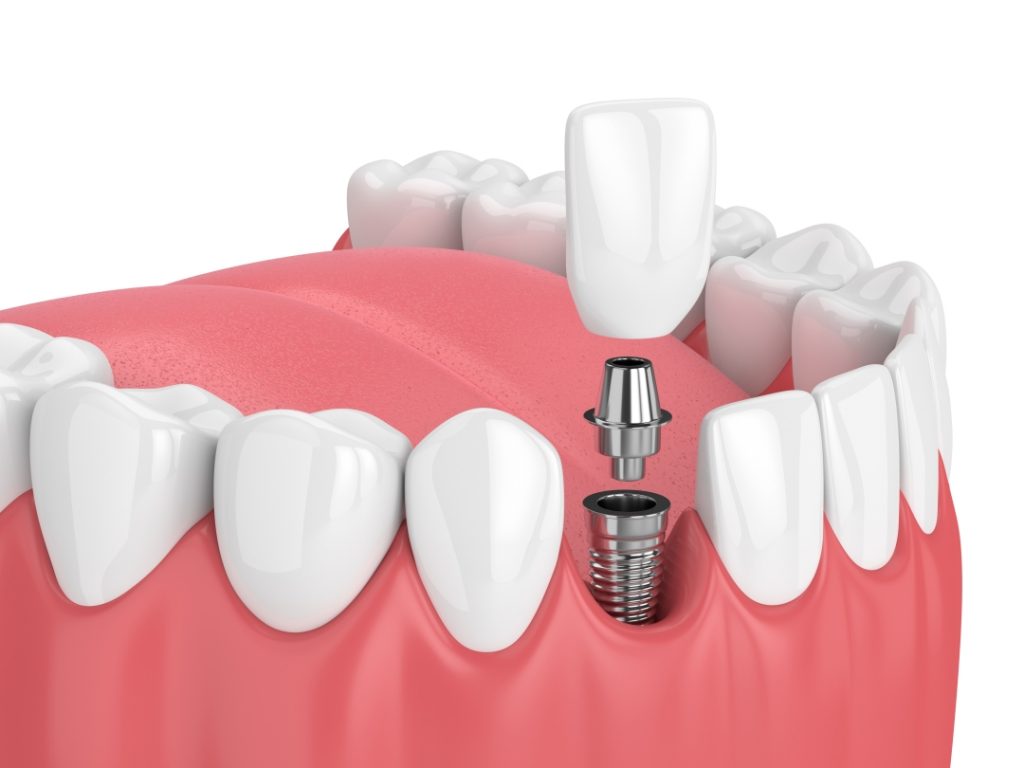You’ve had that sinking feeling. There’s something wrong in your mouth, and you think you know what you need to fix it. Dental implants. That realization has probably unleashed a host of questions, confusion, and stress.
We’ve put together this guide to give you the answers you’re looking for and walk you through the dental implant process, so let’s get started!
What Are Dental Implants?

Contrary to what most patients think, a dental implant doesn’t look like a tooth. Instead, it’s a titanium rod that sits in the jawbone below the gum line. The implant acts like the root of a tooth that Dr. Trujillo can then attach one of the following to:
- Dental Crown
- Dental Bridge
- A partial or full denture
The implant itself fuses with your jawbone, which makes it a strong and solid anchor. The crown (or other dental fixtures) attached to the implant won’t move out of place, and it will look and feel like a normal tooth.
Are Dental Implants Safe?
Yes, dental implants are safe.
The advanced technology used for implants makes them one of the most reliable treatments to replace missing teeth, and they have a 98% success rate. As long as you follow Dr. Trujillo’s instructions and take care of your implant properly, you shouldn’t experience any problems during or after the procedure.
How Much Do Dental Implants Cost?
It’s difficult to put a price tag on dental implants because the treatment looks a little different for each patient. For example, each of these factors can make the dental implant cost go up or down:
- Condition of the bone (do you need a bone graft before the implant?)
- Types of dental implants
- How many implants you need
- The location of the implant (such as the front or back of the mouth)
The only way to get an accurate estimate for the procedure is to talk to Dr. Trujillo about your individual needs. Most dental insurance policies will also make covering the cost much easier.
How Long Do Dental Implants Last?
If you take care of your dental implant properly, such as brushing and flossing every day, they can last for the rest of your life. This isn’t always possible, especially if you have poor oral habits or preexisting health conditions. However, in most cases, you won’t have to worry about replacing your dental implant.
How Long Does It Take to Get a Dental Implant?
Again, the answer to this question depends on your exact treatment plan.
The entire process can take between three to nine months and include multiple different appointments. For example, after you get the implant, you’ll need to wait for the incision to heal before adding the abutment and crown. The process will also take longer if you need a bone graft to improve the condition of the jawbone before inserting the implant.
Dr. Trujillo will be able to give you a more specific timeline after assessing your individual needs.
Are Dental Implants Painful?
Dental implants aren’t pain-free, but the pain is very manageable.
During the procedure, you will receive anesthesia, so you shouldn’t feel any pain as Dr. Trujillo inserts the implant. After that, you might feel mild discomfort throughout the healing process, depending on your pain tolerance.
Dr. Trujillo will likely prescribe you some medication to help relieve any pain. You can also take over-the-counter pain meds as time goes on to help manage the symptoms.
How Long Does It Take a Dental Implant to Heal?
Since dental implant procedures require multiple steps, you will go through several different rounds of healing. For example, you’ll need to let your implant heal before you can attach an abutment. You may then also need to let the abutment heal before putting a crown on top.
The healing time varies depending on your personal health and what stage of the process you’re in; however, you should expect between three to six weeks for each one.
Who Is a Good Candidate for Dental Implants?
As long as you’re in good health, both orally and generally, you should be a good candidate for a dental implant. You may not be a good candidate if you:
- Don’t have enough jawbone left to support the implant
- Have a chronic health condition, such as diabetes or heart disease
- Smoke heavily
- Are going through radiation therapy
If you fit into one of these categories, don’t count yourself out just yet. These conditions must be evaluated on a case-by-case basis. Depending on your situation, you may still be able to benefit from this treatment.
What Is the Downside of Dental Implants?
While getting a dental implant involves minimal risk, it is still a medical procedure. Because of this, there are a few side effects that can happen during the healing process.
Some of them include:
- Pain
- Inflammation
- Swelling of the gums or face
- Bleeding
- Infection
These are rare, though. If you do experience them, they should be minor, and you should recover quickly. You can talk to Dr. Trujillo about any concerns, and they will be able to help you resolve any problems.
Are There Alternatives to Dental Implants?
Yes. If you don’t want to get an implant (or if it isn’t the best choice for you), there are many other options you can choose from. For example, you can get removable dentures instead, and you may even be able to get a mini dental implant, which is much smaller and less invasive than a traditional one.
Talk to Dr. Trujillo about the options. They will help you pick the best option for your health.
Taking the First Step Toward Your Dental Implant
Do you think you might be a good candidate for dental implants?
Don’t hesitate to schedule a consultation with Dr. Trujillo at Arizona Periodontal Group. He will give you a detailed examination and help you set up a treatment plan that works for your health (and your budget!).





